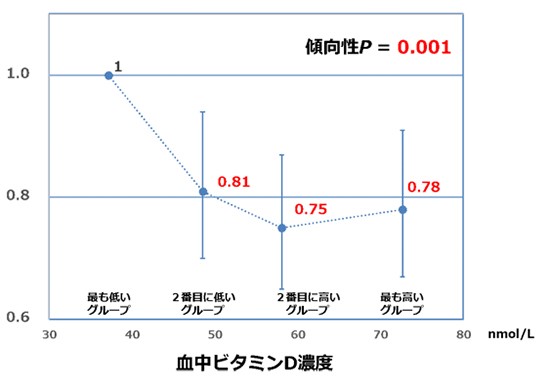News
High Level of Vitamin D in Blood Can Lower Risks for Cancer: National Cancer Center Japan Conducts Largescale Survey Updated in May 2018
On March 8, the National Cancer Center Japan (NCCJ) revealed that high levels of Vitamin D in one’s blood can lower risks for cancer. This result was based on a long-term survey tracking 34,000 people. The paper on this subject was published on the online version of the British Medical Journal (BMJ).
From a group of 34,000 men and women aged 40-69 who responded to an epidemiological survey in 1990 and 1993 in eight prefectures (Iwate, Akita, Nagano, Ibaraki, Niigata, Kochi, Nagasaki, and Okinawa) NCCJ’s research group tracked and followed them until the year 2009. The group did a detailed analysis between the vitamin D concentration in the blood and cancer risks for 8,190 people. Out of 8,190 people, 3,734 were those who got cancer. And 4,456 were those who were randomly chosen from the survey pool. Specifically, the group divided the respondents into four groups depending on their levels of vitamin D concentration in the blood. Based on the group with the lowest level, the other three groups were compared to see the risks for developing cancer.
Based on the group with the lowest vitamin D concentration in the blood, the risk for cancer fell by 19% in the second lowest group. The risk fell by 25% in the second highest group. The risk fell by 22% in the group with the highest concentration of vitamin D. Regarding types of cancer, risks for liver cancer reduced 55% in the group with the highest vitamin D concentration. Risks for prostate cancer was 36% less. Risks were also reduced for many other types of cancers, as well.
According NCCJ, Vitamin D is a lipid soluble vitamin that plays an important role in bone metabolism along with calcium. Recent studies suggest that vitamin D may be effective in preventing cancer by inhibiting cell proliferation or promoting cell death.
Together with Japan’s National Cerebral and Cardiovascular Center (NCCC), NCCJ had previously conducted a similar large-scale survey which tracked down many people for an extended period of time. As a result, it was announced in September 2017 that people with high magnesium intake had lower risks of ischemic heart diseases, like myocardial infarction, compared to those with less magnesium intake.
https://www.bmj.com/content/360/bmj.k671








